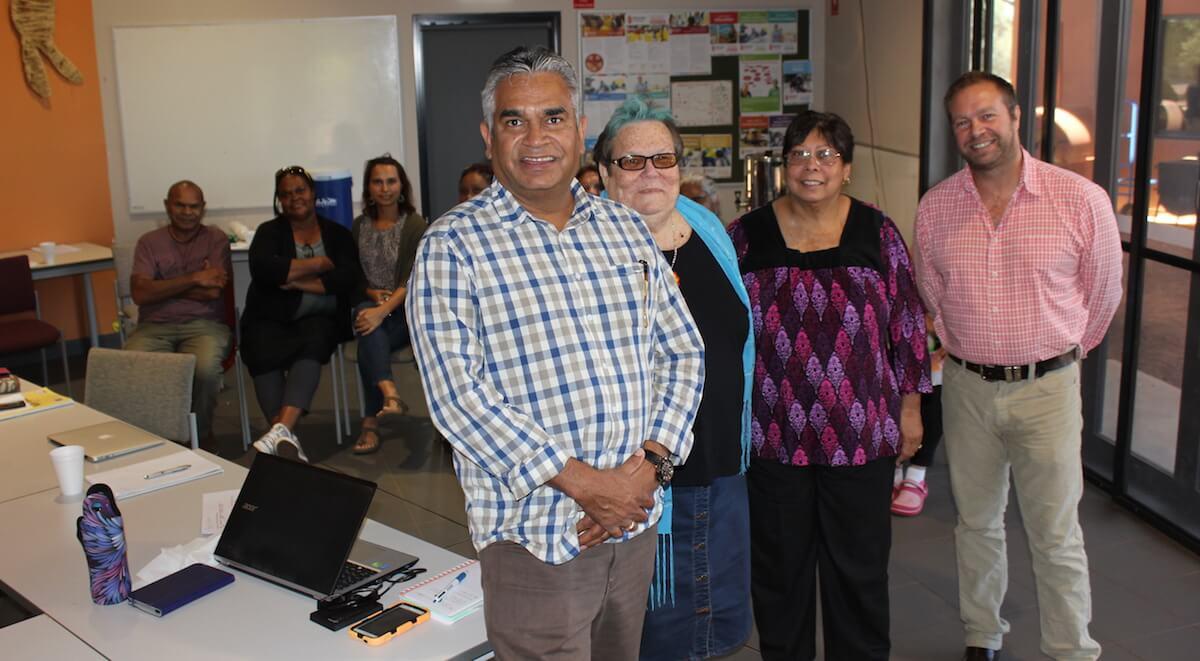

Despite historically being underrepresented in higher education, Aboriginal and Torres Strait Islander Masters and PhD candidates at the Batchelor Institute of Indigenous Tertiary Education are setting a national example. Showcasing the kinds of work and achievements that are possible when tertiary education operates in a culturally competent manner and facilitates an understanding and appreciation of First Nations’ ways of being and knowing.
Aboriginal and Torres Strait Islander Masters and PhD candidates from around the country converged on Alice Springs last week as a part of a five-day master class. The event offered research candidates an opportunity to engage with their supervisors in a culturally safe environment via formal and informal discussions and fostered connections locally, nationally and internationally.
The week-long program allowed for the development of areas of research excellence through Indigenous guidance from the Office of Elders. Batchelor Institute academics Dr Stephen Hagan (Kullilli), Dr Sue Stanton (Kungarakan) spoke with the group, as well as invited speakers Dr Christine Fejo-King (Larrakia) and Professor Barry Judd (Pitjanjatjara), who all shared their study journeys.
Elder Academic and Cultural Leadership Dr Sue Stanton addressed the group.
“As Aboriginal and Torres Strait Islander researchers it is important to never lose sight of, and to be constantly reminding ourselves, that it is vitally important to define our own terms in relation to our research and or our projects. This attitude and approach should not just be confined to our academic pursuits in the western academy. I encourage you to always be stating and re-stating your research goals from within your own cultural framework – whether that might may be a vibrantly rich single cultural background or a mixed cultural framework.”
“By this I mean that even though you may identify strongly as being affiliated with one cultural group, you must not dismiss the other parts of the essential you that could be made up of many different life learnings and knowledges as a result of the different cultural influences that make up the essential you.”
“As we know, we end up the way we are due to the way we have been socialised – most importantly, first, within our families, our clans or language groups, our education – whether within our Aboriginal and Torres Strait Islander heritage or a combination of that and the western influences we have been exposed to through compulsory schooling and education. Sometimes these may complement each other, but in most cases they clash instead.”
“I say – do not be afraid of this if and when the clash happens. Instead, learn to accommodate the foreign concepts and manipulate or massage them to fit into your way of knowing, understanding – massage or mould new concepts into something you can control, and ultimately use to your advantage,” said Dr Stanton.
“The most important thing is that you stand your ground. Do not be bullied or allow yourself into believing or accepting that someone else’s way is better than yours. Stand your ground.”
Dr Stephen Hagan also spoke of his experiences obtaining his PhD and being raised in rural Queensland.
“I was raised in a fringe camp – out of sight, out of mind – in rural Queensland in the late 1950s when the dead at the local cemetery were treated better than my mob. They had three taps available to them for their families to water their grassed plots or to fill vases to hold water to keep flowers fresh to place on their grave, and yet over 300 fringe dwellers on adjacent lands had to make the long trek to the river to access water for household consumption. It’s not hard to then envisage the level of racism I endured and continue to endure throughout my formal studies of achieving the ultimate award of a PhD,” said Dr Hagan.
“I only wish I had four strongly connected Aboriginal PhDs talk to me when I was a post-graduate student to share their critical advice on how to take on challenges that confront them daily. From issues with their supervisors, to understanding which methodology or theory to apply”
Batchelor Institute is making headway in increasing the amount of Indigenous Australians progressing through higher education. Studies have discovered that although the number of Aboriginal and Torres Strait Islander students in research has increased slightly over the past decade (from 0.84% in 2004 to 1.11 in 2014), PhD completion rates have hardly changed (from 0.53% in 2005 to 0.55% in 2014).
Additionally, further research coming out of New Zealand highlights that Indigenous Māori PhD candidates require support in managing conflicts or tensions between their academic and cultural identities. At Batchelor Institute the research approach privileges the voices of First Nations’ peoples by engaging in culturally enriched study opportunities that promote innovation and agency. Central across all activities is research that affirms, promotes, and is guided by the contemporary perspectives of Aboriginal and Torres Strait Islanders.
This has resulted in 16 Higher Degree by Research Candidates in 2015 (15/16 identifying as Aboriginal and/or Torres Strait Islander), with 8 studying a Masters by Research and 8 undertaking a PhD. Almost 40% of these research students came from remote or very remote locations.
Batchelor Institute’s Graduate School offers a Masters of Indigenous Perspectives and a PhD in Indigenous Perspectives. Candidates in postgraduate programs undertake projects within the areas of education, creative arts, languages and livelihoods.
